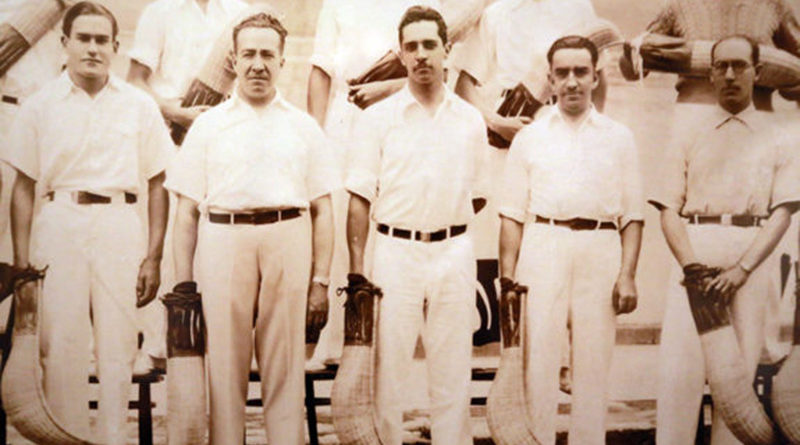Tex-Mex Proprietor Misses Lost Sport of Jai Alai
A display of a 1932 team photo featuring Fernando Padilla’s father (with the mustache).
Fernando Padilla didn’t grow up aspiring to become a successful restaurateur. Rather, he grew up dreaming of superstardom as a pelotari in the finest frontons in his native Mexico.
Padilla, who owns and operates two Fernando’s locations in Dallas, was a rising star in the obscure sport of jai alai (HI-uh-LI), following in the footsteps of his father and grandfather. During the 1970s, he earned a spot on the Mexican national team and signed a lucrative professional contract.
“That was my main interest,” Padilla said. “That’s what I wanted to pursue.”
But Padilla never played a game either for his country or his professional club. A players’ strike lasting more than a decade in Mexico derailed his athletic career and altered his career path. He came to Dallas, met some people in the food industry, started by cleaning kitchens and tending bar, and gradually worked his way up.
In 2005, after developing a background in finance, Padilla found the right mix of concept and location and opened his eponymous eatery on the northeast corner of Northwest Highway and Midway Road.
“It was time for a change,” he said. “After many years in the industry, I wanted to test the waters and try something different.”
Some of the decor in his restaurant recalls his jai alai past, and he’ll always have the memories from a once-proud sport that was decimated by financial greed.

“We were making a ton of money playing the game we loved, but it wasn’t enough,” Padilla said. “I had no choice. That was that.”
Jai alai is a fast-paced sport resembling racquetball that originated in northern Spain and became popular in North America during the 20th century. At its peak, it was played professionally in various sections of the United States, where it became popular among gamblers.
However, player discontent and other factors led to a gradual decline in an era of more diverse entertainment options. Only recently have efforts among casino owners and fans led to a mild resurgence in south Florida. And the most prominent facility in Mexico City reopened last year after a 20-year closure.
Meanwhile, Padilla hasn’t lost his passion for the game. He has reconnected with some former teammates online, and hopes one day he can retire and become a volunteer coach to help pass jai alai to future generations.
But his second choice has worked out great. Padilla’s two restaurants feature a section of the menu devoted to authentic cuisine from Mexico City, along with an extensive wine list and other unique touches.
“I wanted it to be good, but I wanted it to be a little different from everybody else,” Padilla said. “There are lots of good restaurants and good operators in town. If you’re not doing it right, you’re not going to be around.”









